Precepting versus Mentoring in Nursing: A Portfolio Reflection
VerifiedAdded on 2020/05/03
|7
|1347
|87
Report
AI Summary
This report, structured as a portfolio, delves into the concepts of precepting and mentoring within the nursing profession, emphasizing their impact on newly employed staff nurses. It differentiates between precepting, which focuses on task-specific, short-term goals, and mentoring, which offers a broader developmental approach. The report highlights the role of preceptors in orienting new nurses and the importance of effective communication and feedback. It examines personal experiences, including challenges faced in emergency clinical settings, such as dealing with challenging patient behaviors and cultural communication barriers. The report also proposes strategies for providing constructive feedback to both staff and patients, and emphasizes the need for regular meetings, training sessions, and informed decision-making processes. References to relevant literature support the analysis.
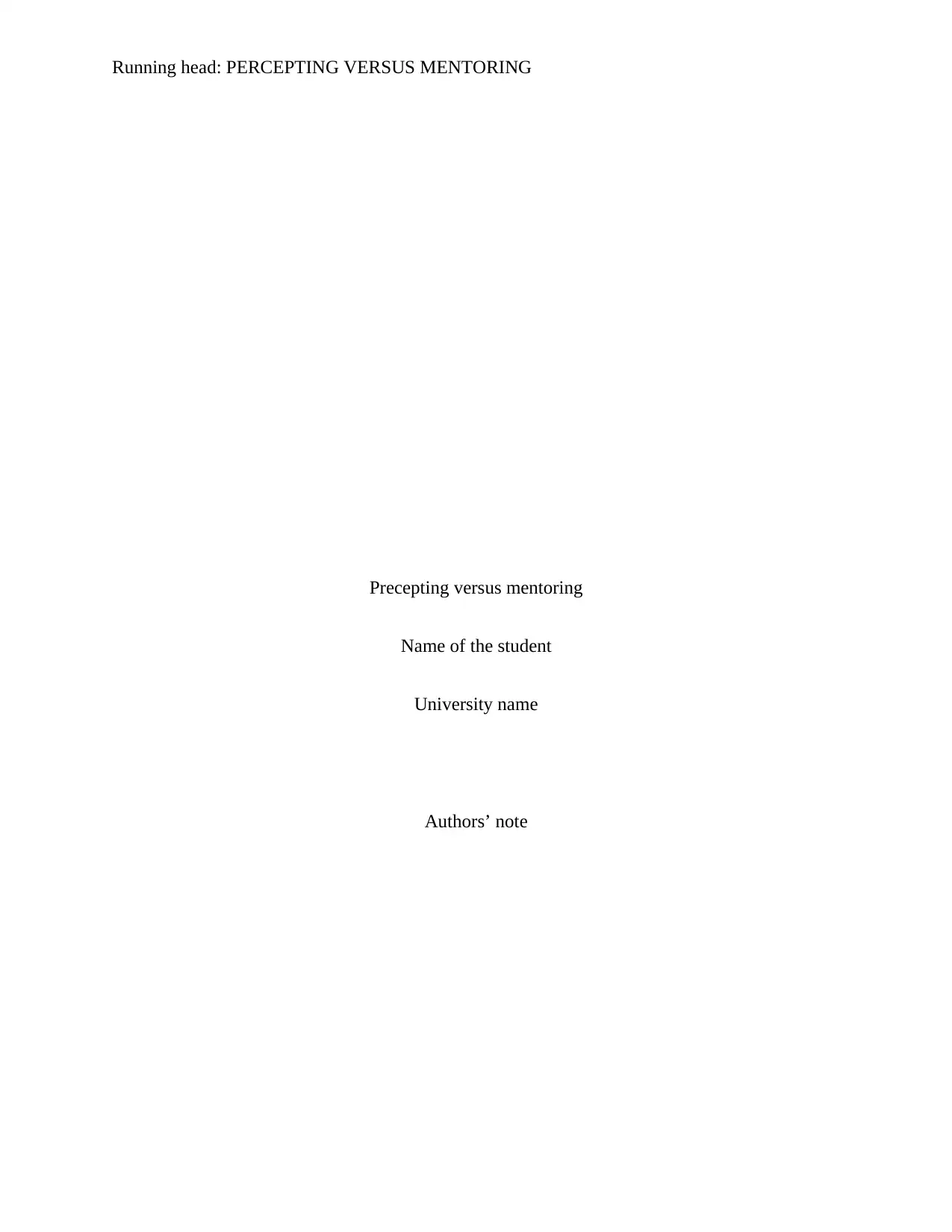
Running head: PERCEPTING VERSUS MENTORING
Precepting versus mentoring
Name of the student
University name
Authors’ note
Precepting versus mentoring
Name of the student
University name
Authors’ note
Paraphrase This Document
Need a fresh take? Get an instant paraphrase of this document with our AI Paraphraser
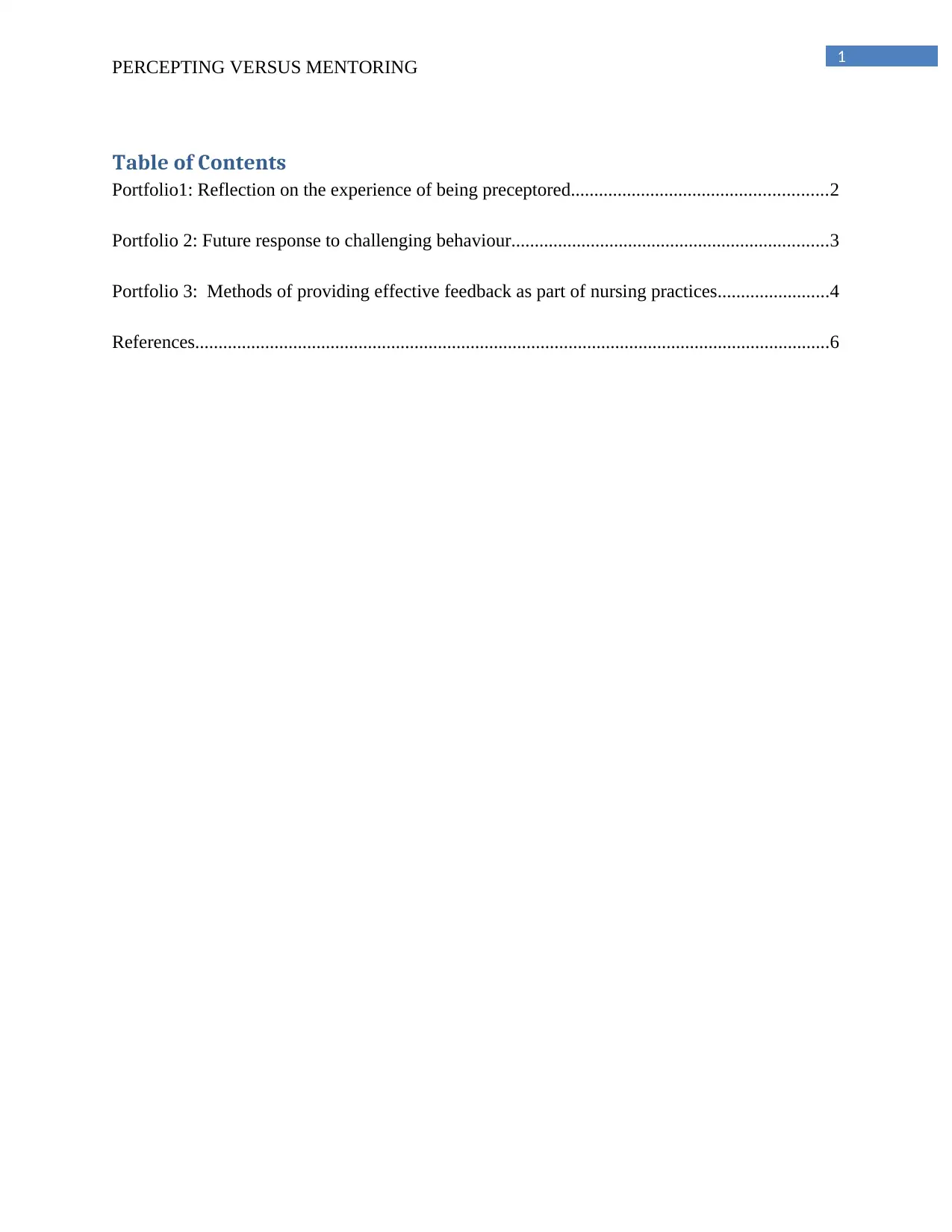
1
PERCEPTING VERSUS MENTORING
Table of Contents
Portfolio1: Reflection on the experience of being preceptored.......................................................2
Portfolio 2: Future response to challenging behaviour....................................................................3
Portfolio 3: Methods of providing effective feedback as part of nursing practices........................4
References........................................................................................................................................6
PERCEPTING VERSUS MENTORING
Table of Contents
Portfolio1: Reflection on the experience of being preceptored.......................................................2
Portfolio 2: Future response to challenging behaviour....................................................................3
Portfolio 3: Methods of providing effective feedback as part of nursing practices........................4
References........................................................................................................................................6
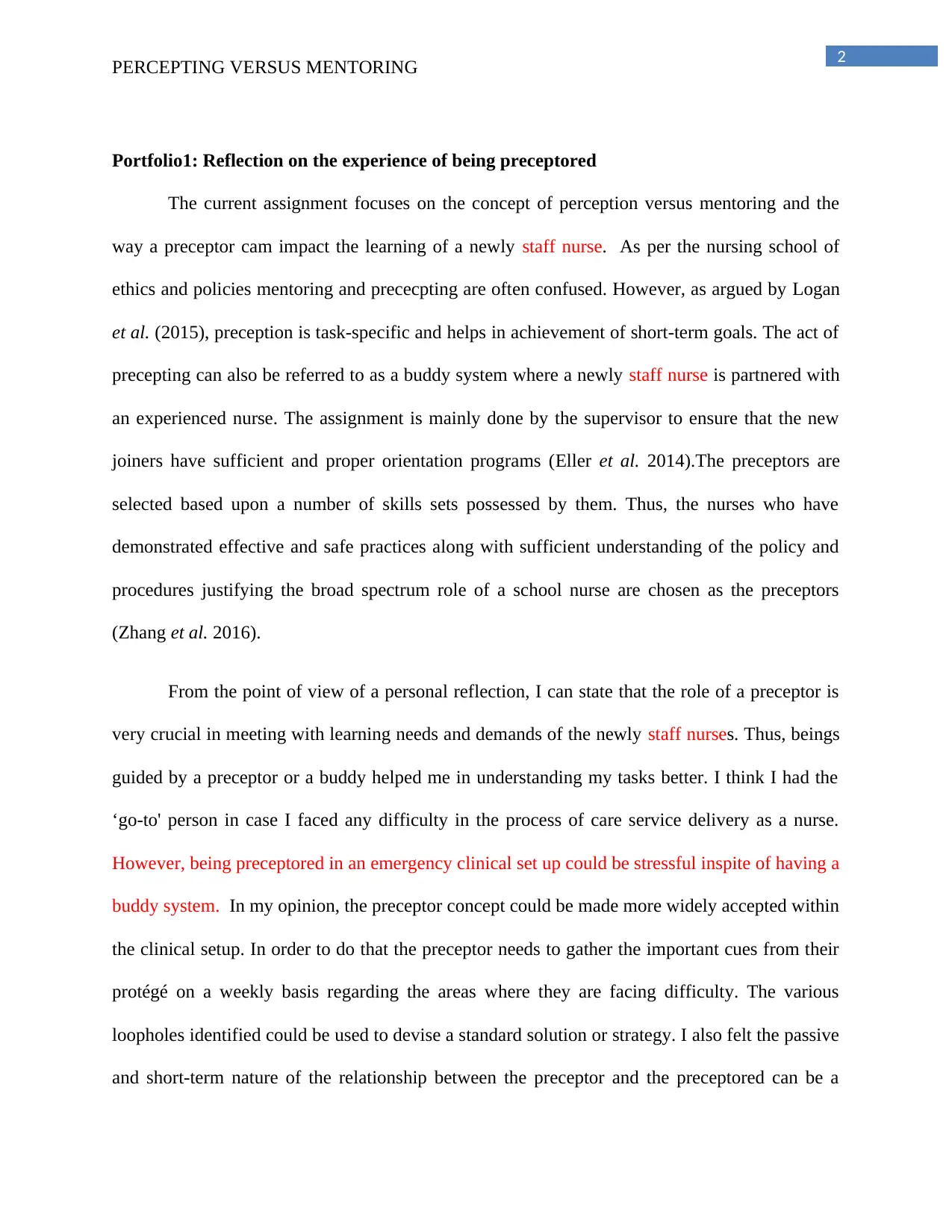
2
PERCEPTING VERSUS MENTORING
Portfolio1: Reflection on the experience of being preceptored
The current assignment focuses on the concept of perception versus mentoring and the
way a preceptor cam impact the learning of a newly staff nurse. As per the nursing school of
ethics and policies mentoring and prececpting are often confused. However, as argued by Logan
et al. (2015), preception is task-specific and helps in achievement of short-term goals. The act of
precepting can also be referred to as a buddy system where a newly staff nurse is partnered with
an experienced nurse. The assignment is mainly done by the supervisor to ensure that the new
joiners have sufficient and proper orientation programs (Eller et al. 2014).The preceptors are
selected based upon a number of skills sets possessed by them. Thus, the nurses who have
demonstrated effective and safe practices along with sufficient understanding of the policy and
procedures justifying the broad spectrum role of a school nurse are chosen as the preceptors
(Zhang et al. 2016).
From the point of view of a personal reflection, I can state that the role of a preceptor is
very crucial in meeting with learning needs and demands of the newly staff nurses. Thus, beings
guided by a preceptor or a buddy helped me in understanding my tasks better. I think I had the
‘go-to' person in case I faced any difficulty in the process of care service delivery as a nurse.
However, being preceptored in an emergency clinical set up could be stressful inspite of having a
buddy system. In my opinion, the preceptor concept could be made more widely accepted within
the clinical setup. In order to do that the preceptor needs to gather the important cues from their
protégé on a weekly basis regarding the areas where they are facing difficulty. The various
loopholes identified could be used to devise a standard solution or strategy. I also felt the passive
and short-term nature of the relationship between the preceptor and the preceptored can be a
PERCEPTING VERSUS MENTORING
Portfolio1: Reflection on the experience of being preceptored
The current assignment focuses on the concept of perception versus mentoring and the
way a preceptor cam impact the learning of a newly staff nurse. As per the nursing school of
ethics and policies mentoring and prececpting are often confused. However, as argued by Logan
et al. (2015), preception is task-specific and helps in achievement of short-term goals. The act of
precepting can also be referred to as a buddy system where a newly staff nurse is partnered with
an experienced nurse. The assignment is mainly done by the supervisor to ensure that the new
joiners have sufficient and proper orientation programs (Eller et al. 2014).The preceptors are
selected based upon a number of skills sets possessed by them. Thus, the nurses who have
demonstrated effective and safe practices along with sufficient understanding of the policy and
procedures justifying the broad spectrum role of a school nurse are chosen as the preceptors
(Zhang et al. 2016).
From the point of view of a personal reflection, I can state that the role of a preceptor is
very crucial in meeting with learning needs and demands of the newly staff nurses. Thus, beings
guided by a preceptor or a buddy helped me in understanding my tasks better. I think I had the
‘go-to' person in case I faced any difficulty in the process of care service delivery as a nurse.
However, being preceptored in an emergency clinical set up could be stressful inspite of having a
buddy system. In my opinion, the preceptor concept could be made more widely accepted within
the clinical setup. In order to do that the preceptor needs to gather the important cues from their
protégé on a weekly basis regarding the areas where they are facing difficulty. The various
loopholes identified could be used to devise a standard solution or strategy. I also felt the passive
and short-term nature of the relationship between the preceptor and the preceptored can be a
⊘ This is a preview!⊘
Do you want full access?
Subscribe today to unlock all pages.

Trusted by 1+ million students worldwide
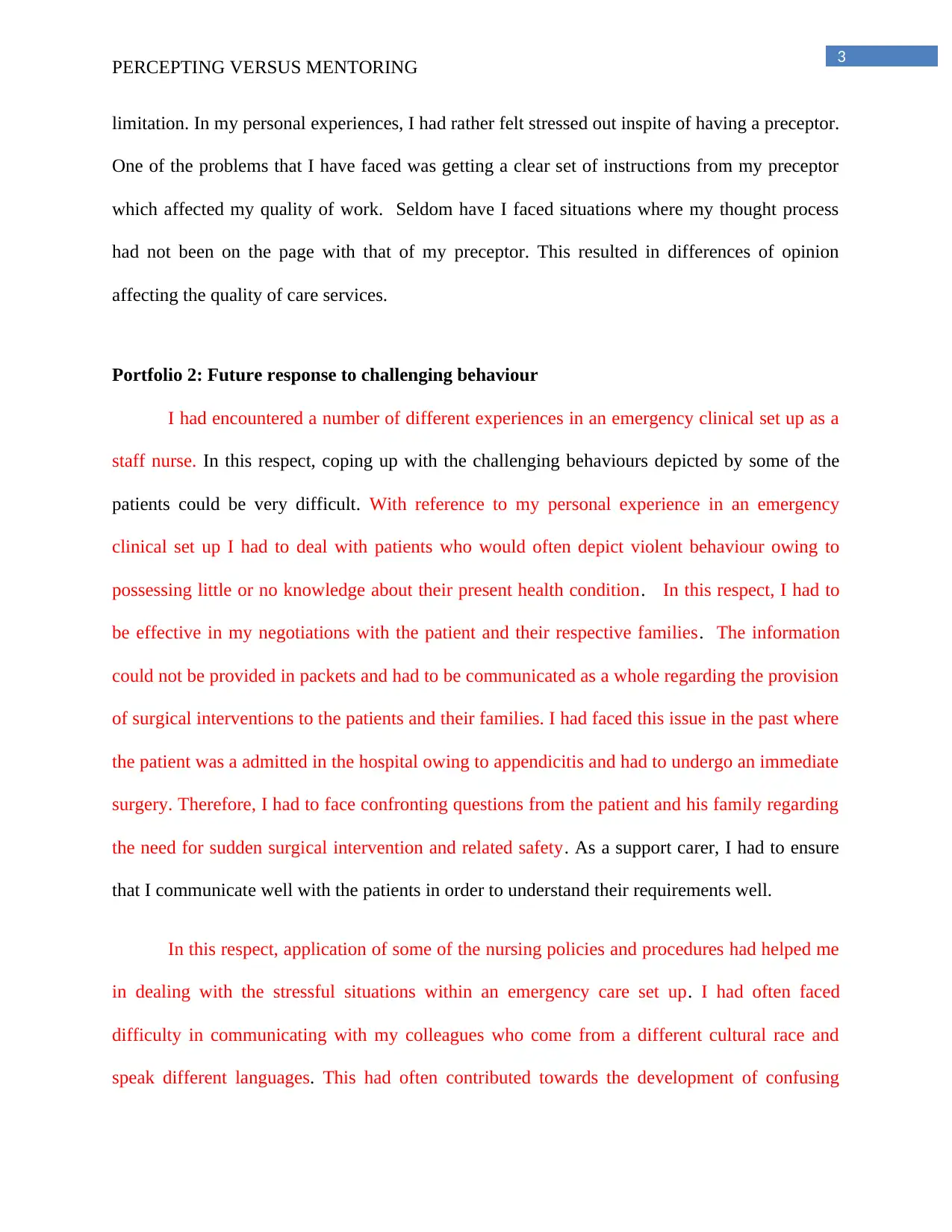
3
PERCEPTING VERSUS MENTORING
limitation. In my personal experiences, I had rather felt stressed out inspite of having a preceptor.
One of the problems that I have faced was getting a clear set of instructions from my preceptor
which affected my quality of work. Seldom have I faced situations where my thought process
had not been on the page with that of my preceptor. This resulted in differences of opinion
affecting the quality of care services.
Portfolio 2: Future response to challenging behaviour
I had encountered a number of different experiences in an emergency clinical set up as a
staff nurse. In this respect, coping up with the challenging behaviours depicted by some of the
patients could be very difficult. With reference to my personal experience in an emergency
clinical set up I had to deal with patients who would often depict violent behaviour owing to
possessing little or no knowledge about their present health condition. In this respect, I had to
be effective in my negotiations with the patient and their respective families. The information
could not be provided in packets and had to be communicated as a whole regarding the provision
of surgical interventions to the patients and their families. I had faced this issue in the past where
the patient was a admitted in the hospital owing to appendicitis and had to undergo an immediate
surgery. Therefore, I had to face confronting questions from the patient and his family regarding
the need for sudden surgical intervention and related safety. As a support carer, I had to ensure
that I communicate well with the patients in order to understand their requirements well.
In this respect, application of some of the nursing policies and procedures had helped me
in dealing with the stressful situations within an emergency care set up. I had often faced
difficulty in communicating with my colleagues who come from a different cultural race and
speak different languages. This had often contributed towards the development of confusing
PERCEPTING VERSUS MENTORING
limitation. In my personal experiences, I had rather felt stressed out inspite of having a preceptor.
One of the problems that I have faced was getting a clear set of instructions from my preceptor
which affected my quality of work. Seldom have I faced situations where my thought process
had not been on the page with that of my preceptor. This resulted in differences of opinion
affecting the quality of care services.
Portfolio 2: Future response to challenging behaviour
I had encountered a number of different experiences in an emergency clinical set up as a
staff nurse. In this respect, coping up with the challenging behaviours depicted by some of the
patients could be very difficult. With reference to my personal experience in an emergency
clinical set up I had to deal with patients who would often depict violent behaviour owing to
possessing little or no knowledge about their present health condition. In this respect, I had to
be effective in my negotiations with the patient and their respective families. The information
could not be provided in packets and had to be communicated as a whole regarding the provision
of surgical interventions to the patients and their families. I had faced this issue in the past where
the patient was a admitted in the hospital owing to appendicitis and had to undergo an immediate
surgery. Therefore, I had to face confronting questions from the patient and his family regarding
the need for sudden surgical intervention and related safety. As a support carer, I had to ensure
that I communicate well with the patients in order to understand their requirements well.
In this respect, application of some of the nursing policies and procedures had helped me
in dealing with the stressful situations within an emergency care set up. I had often faced
difficulty in communicating with my colleagues who come from a different cultural race and
speak different languages. This had often contributed towards the development of confusing
Paraphrase This Document
Need a fresh take? Get an instant paraphrase of this document with our AI Paraphraser
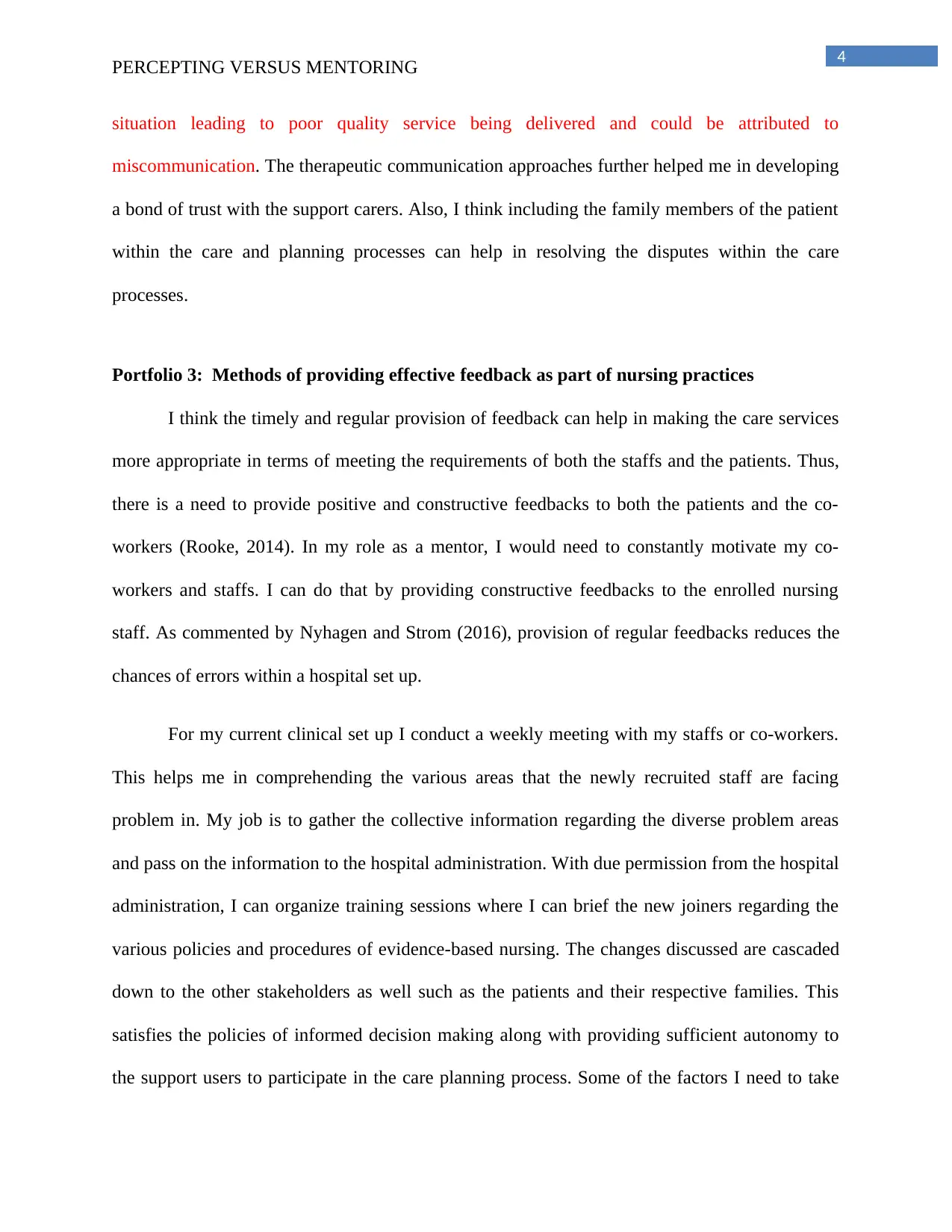
4
PERCEPTING VERSUS MENTORING
situation leading to poor quality service being delivered and could be attributed to
miscommunication. The therapeutic communication approaches further helped me in developing
a bond of trust with the support carers. Also, I think including the family members of the patient
within the care and planning processes can help in resolving the disputes within the care
processes.
Portfolio 3: Methods of providing effective feedback as part of nursing practices
I think the timely and regular provision of feedback can help in making the care services
more appropriate in terms of meeting the requirements of both the staffs and the patients. Thus,
there is a need to provide positive and constructive feedbacks to both the patients and the co-
workers (Rooke, 2014). In my role as a mentor, I would need to constantly motivate my co-
workers and staffs. I can do that by providing constructive feedbacks to the enrolled nursing
staff. As commented by Nyhagen and Strom (2016), provision of regular feedbacks reduces the
chances of errors within a hospital set up.
For my current clinical set up I conduct a weekly meeting with my staffs or co-workers.
This helps me in comprehending the various areas that the newly recruited staff are facing
problem in. My job is to gather the collective information regarding the diverse problem areas
and pass on the information to the hospital administration. With due permission from the hospital
administration, I can organize training sessions where I can brief the new joiners regarding the
various policies and procedures of evidence-based nursing. The changes discussed are cascaded
down to the other stakeholders as well such as the patients and their respective families. This
satisfies the policies of informed decision making along with providing sufficient autonomy to
the support users to participate in the care planning process. Some of the factors I need to take
PERCEPTING VERSUS MENTORING
situation leading to poor quality service being delivered and could be attributed to
miscommunication. The therapeutic communication approaches further helped me in developing
a bond of trust with the support carers. Also, I think including the family members of the patient
within the care and planning processes can help in resolving the disputes within the care
processes.
Portfolio 3: Methods of providing effective feedback as part of nursing practices
I think the timely and regular provision of feedback can help in making the care services
more appropriate in terms of meeting the requirements of both the staffs and the patients. Thus,
there is a need to provide positive and constructive feedbacks to both the patients and the co-
workers (Rooke, 2014). In my role as a mentor, I would need to constantly motivate my co-
workers and staffs. I can do that by providing constructive feedbacks to the enrolled nursing
staff. As commented by Nyhagen and Strom (2016), provision of regular feedbacks reduces the
chances of errors within a hospital set up.
For my current clinical set up I conduct a weekly meeting with my staffs or co-workers.
This helps me in comprehending the various areas that the newly recruited staff are facing
problem in. My job is to gather the collective information regarding the diverse problem areas
and pass on the information to the hospital administration. With due permission from the hospital
administration, I can organize training sessions where I can brief the new joiners regarding the
various policies and procedures of evidence-based nursing. The changes discussed are cascaded
down to the other stakeholders as well such as the patients and their respective families. This
satisfies the policies of informed decision making along with providing sufficient autonomy to
the support users to participate in the care planning process. Some of the factors I need to take
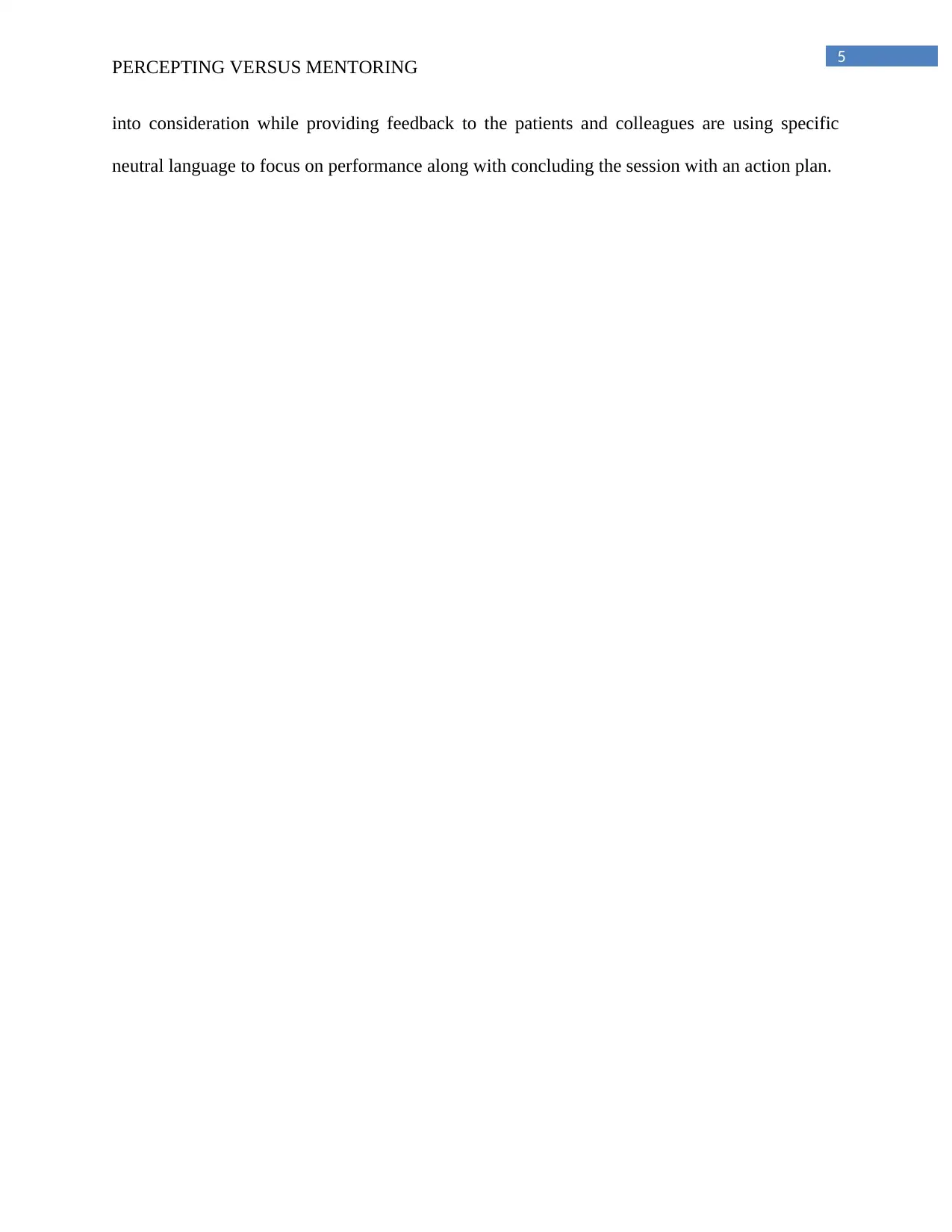
5
PERCEPTING VERSUS MENTORING
into consideration while providing feedback to the patients and colleagues are using specific
neutral language to focus on performance along with concluding the session with an action plan.
PERCEPTING VERSUS MENTORING
into consideration while providing feedback to the patients and colleagues are using specific
neutral language to focus on performance along with concluding the session with an action plan.
⊘ This is a preview!⊘
Do you want full access?
Subscribe today to unlock all pages.

Trusted by 1+ million students worldwide
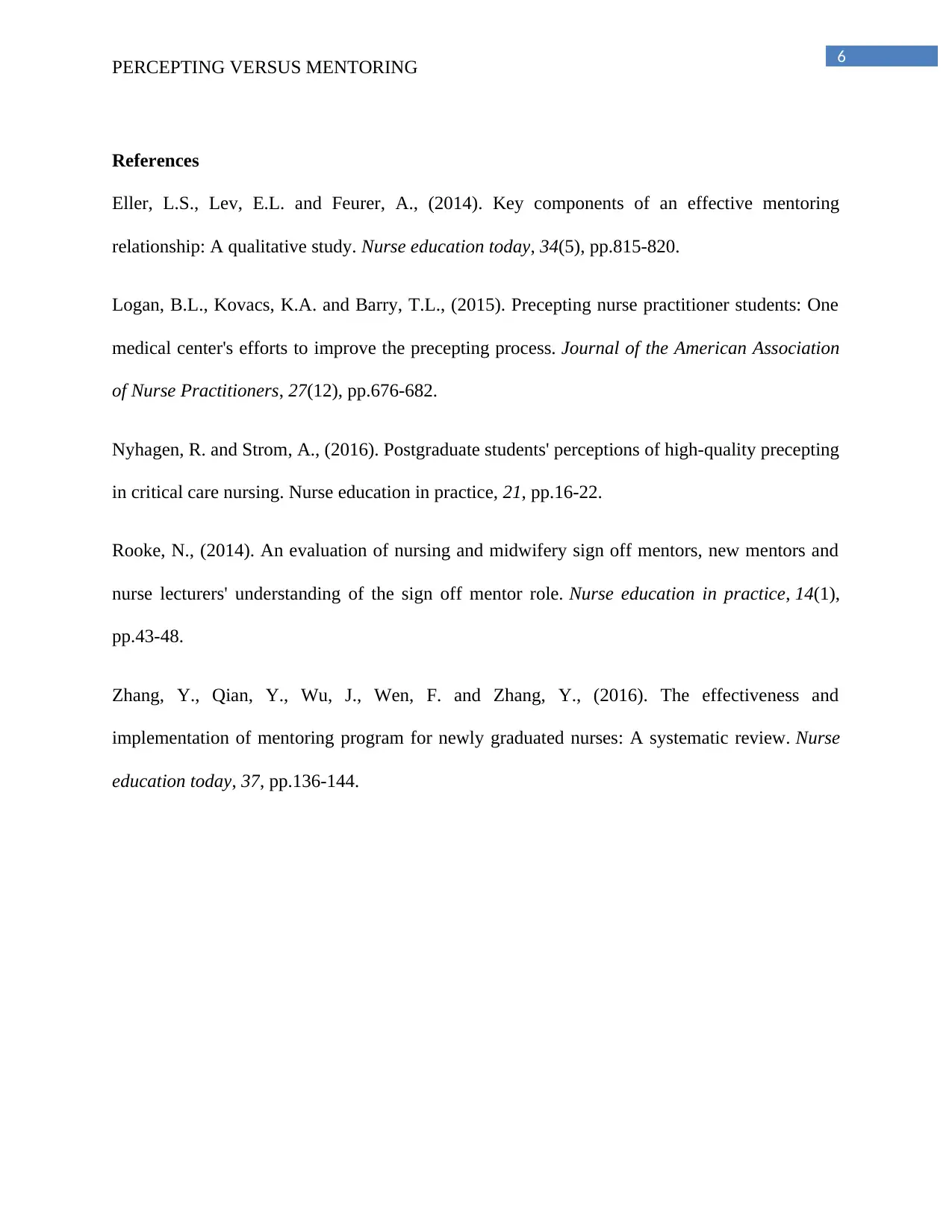
6
PERCEPTING VERSUS MENTORING
References
Eller, L.S., Lev, E.L. and Feurer, A., (2014). Key components of an effective mentoring
relationship: A qualitative study. Nurse education today, 34(5), pp.815-820.
Logan, B.L., Kovacs, K.A. and Barry, T.L., (2015). Precepting nurse practitioner students: One
medical center's efforts to improve the precepting process. Journal of the American Association
of Nurse Practitioners, 27(12), pp.676-682.
Nyhagen, R. and Strom, A., (2016). Postgraduate students' perceptions of high-quality precepting
in critical care nursing. Nurse education in practice, 21, pp.16-22.
Rooke, N., (2014). An evaluation of nursing and midwifery sign off mentors, new mentors and
nurse lecturers' understanding of the sign off mentor role. Nurse education in practice, 14(1),
pp.43-48.
Zhang, Y., Qian, Y., Wu, J., Wen, F. and Zhang, Y., (2016). The effectiveness and
implementation of mentoring program for newly graduated nurses: A systematic review. Nurse
education today, 37, pp.136-144.
PERCEPTING VERSUS MENTORING
References
Eller, L.S., Lev, E.L. and Feurer, A., (2014). Key components of an effective mentoring
relationship: A qualitative study. Nurse education today, 34(5), pp.815-820.
Logan, B.L., Kovacs, K.A. and Barry, T.L., (2015). Precepting nurse practitioner students: One
medical center's efforts to improve the precepting process. Journal of the American Association
of Nurse Practitioners, 27(12), pp.676-682.
Nyhagen, R. and Strom, A., (2016). Postgraduate students' perceptions of high-quality precepting
in critical care nursing. Nurse education in practice, 21, pp.16-22.
Rooke, N., (2014). An evaluation of nursing and midwifery sign off mentors, new mentors and
nurse lecturers' understanding of the sign off mentor role. Nurse education in practice, 14(1),
pp.43-48.
Zhang, Y., Qian, Y., Wu, J., Wen, F. and Zhang, Y., (2016). The effectiveness and
implementation of mentoring program for newly graduated nurses: A systematic review. Nurse
education today, 37, pp.136-144.
1 out of 7
Related Documents
Your All-in-One AI-Powered Toolkit for Academic Success.
+13062052269
info@desklib.com
Available 24*7 on WhatsApp / Email
![[object Object]](/_next/static/media/star-bottom.7253800d.svg)
Unlock your academic potential
Copyright © 2020–2026 A2Z Services. All Rights Reserved. Developed and managed by ZUCOL.




